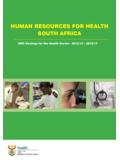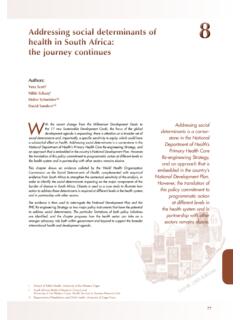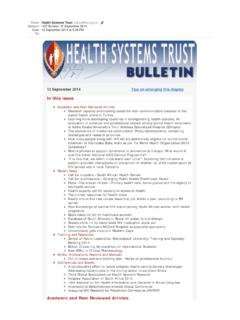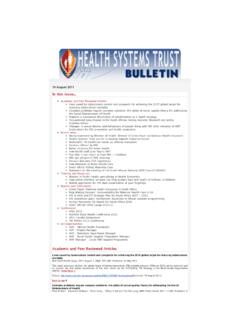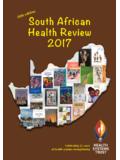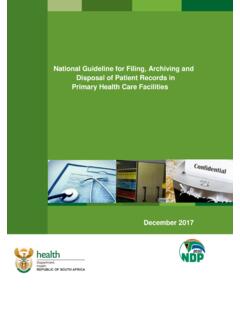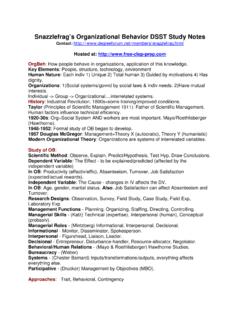Transcription of CATEGORIES ACADEMIC AND PEER REVIEWED …
1 HST Bulletin | 17 November 2017 View this email in your browser CATEGORIES . ACADEMIC and peer REVIEWED Articles Recent News Training and Resources Publications and Reports Conferences and Events Job Opportunities ACADEMIC AND peer REVIEWED ARTICLES. Reaching global HIV/AIDS goals: What got us here, won't get us there Plos One | Published: 7 November 2017. Wafaa M El-Sadr, Katherine Harripersaud, Miriam Rabkin A decade ago, today's progress towards confronting the global HIV epidemic would have been unimaginable. A remarkable global mobilization of resources through the United States President's Emergency Plan for AIDS Relief (PEPFAR) and the Global Fund for AIDS, Tuberculosis and Malaria, combined with the commitment of affected countries and communities, has enabled million persons living with HIV (PLHIV) to access life-saving antiretroviral therapy (ART).
2 This has resulted in decreasing HIV-related morbidity and mortality and contributed to a significant decline in the number of new infections. Contemporary disengagement from antiretroviral therapy in Khayelitsha, South Africa: A cohort study Plos One | Published: 7 November 2017. Samantha R. Kaplan, Christa Oosthuizen, Kathryn Stinson, Francesca Little, Jonathan Euvrard, Michael Schomaker, Meg Osler, Katherine Hilderbrand, et al Retention in care is an essential component of meeting the UNAIDS 90-90-90 HIV treatment targets. In Khayelitsha township (population 500,000) in Cape Town, South Africa, more than 50,000 patients have received antiretroviral therapy (ART) since the inception of this public-sector program in 2001.
3 Disengagement from care remains an important challenge. We sought to determine the incidence of and risk factors associated with disengagement from care during 2013 2014 and outcomes for those who disengaged. Do digital innovations for HIV and sexually transmitted infections work? Results from a systematic review (1996-2017). BMJ | Published: 3 November 2017. Jana Daher, Rohit Vijh, Blake Linthwaite, Sailly Dave, John Kim, Keertan Dheda, Trevor Peter, Nitika Pant Pai Digital innovations with internet/mobile phones offer a potential cost-saving solution for overburdened health systems with high service delivery costs to improve efficiency of HIV/STI (sexually transmitted infections) control initiatives.
4 However, their overall evidence has not yet been appraised. [This study evaluates] the feasibility and impact of all digital innovations for all HIV/STIs. The association between social capital and HIV treatment outcomes in South Africa Plos One | Published: 9 November 2017. Grace Musanse Mukoswa, Salome Charalambous, Gill Nelson HIV treatment has reduced morbidity and mortality. By 2012, it was estimated that of eligible South Africans accessed antiretroviral treatment; however, treatment adherence and retention remain the greatest challenges. There is a growing belief that social capital, seen as "the features of social organization that facilitate cooperation for mutual benefit", is important in promoting HIV treatment retention.
5 The aim of this study was to establish whether social capital is associated with HIV treatment outcomes. Indoor air pollution from secondhand tobacco smoke, solid fuels, and kerosene in homes with active tuberculosis disease in South Africa BioMed Central | Published: 13 November 2017. Jessica L Elf, Onyinyechi Eke, Modiehi Rakgokong, Ebrahim Variava, Yudesh Baliram, Katlego Motlhaoleng, Limakatso Lebina, Adrienne E Shapiro, et al Secondhand tobacco smoke (SHS), use of solid fuels, and kerosene may play an important role in perpetuating the tuberculosis (TB) epidemic. The purpose of this study was to explore the prevalence of household air pollution (HAP) from these sources in homes of someone with TB in a high HIV-prevalence setting.
6 A convenience sample of homes and household members participating in an ongoing active case- finding study in Matlosana district townships surrounding Klerksdorp, South Africa were included. Improving adherence in mental health service users with severe mental illness in South Africa: a pilot randomized controlled trial of a treatment partner and text message intervention vs. treatment as usual BioMed Central | Published: 9 November 2017. Goodman Sibeko, Henk Temmingh, Sumaya Mall, Peter Williams-Ashman, Graham Thornicroft, Ezra S. Susser, Crick Lund, Dan J Stein, Peter D Milligan Medication non-adherence is a significant problem in treatment of severe mental disorders and is associated with poor clinical outcomes and increased demand on services.
7 Task-shifting interventions incorporating mobile health may improve adherence in mental health service users in low- and middle- income countries. Seventy-seven participants were recruited from a psychiatric hospital in Cape Town, with 42 randomized to receive the intervention and 35 to treatment as usual. Intervention pairs underwent treatment-partner contracting and psychoeducation, and received monthly text message reminders of clinic appointments. Quantifying research output on poverty and non-communicable disease behavioural risk factors in low-income and lower middle-income countries: a bibliometric analysis BMJ | Published: 12 November 2017.
8 Luke Nelson Allen, Nicholas Fox, Alissa Ambrose Low-income and lower middle-income countries (LLMICs) bear a disproportionate burden of non- communicable diseases (NCDs). WHO has repeatedly called for more research on poverty and NCDs in these settings, but the current situation remains unquantified. We aimed to assess research output on poverty and NCD risk factors from these countries in relation to upper middle-income and high-income countries. Addressing challenges in scaling up TB and HIV treatment integration in rural primary healthcare clinics in South Africa (SUTHI): a cluster randomized controlled trial protocol BioMed Central | Published: 13 November 2017.
9 Kogieleum Naidoo, Santhanalakshmi Gengiah, Nonhlanhla Yende-Zuma, Nesri Padayatchi, Pierre Barker, Andrew Nunn, Priashni Subrayen, Salim S Abdool Karim A large and compelling clinical evidence base has shown that integrated TB and HIV services leads to reduction in human immunodeficiency virus (HIV)- and tuberculosis (TB)-associated mortality and morbidity. Despite official policies and guidelines recommending TB and HIV care integration, its poor implementation has resulted in TB and HIV remaining the commonest causes of death in several countries in sub-Saharan Africa, including South Africa. This study aims to reduce mortality due to TB-HIV.
10 Co-infection through a quality improvement strategy for scaling up of TB and HIV treatment integration in rural primary healthcare clinics in South Africa. (Return to Top). RECENT NEWS. The Changing Demographics of Global Health Council on Foreign Relations | 7 November 2017. Population growth and aging are fueling a spectacular rise in noncommunicable diseases, such as cancers and cardiovascular diseases, in poor countries that are ill-prepared to handle them. Parliament finally ready to vote on sugary drinks tax Health-e News | 8 November 2017. The tax on sugary drinks will finally go before Parliament to be voted on within the next few weeks after more than a year of intense consultation.
